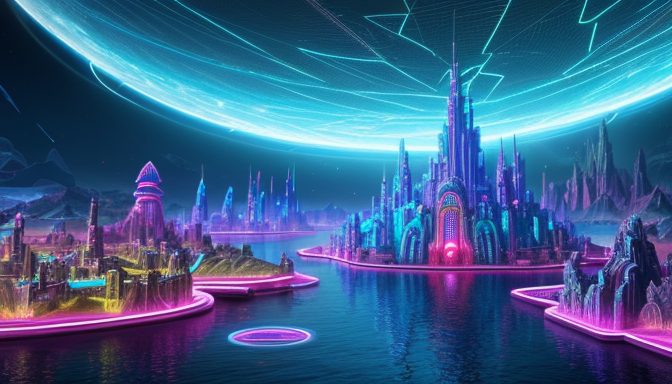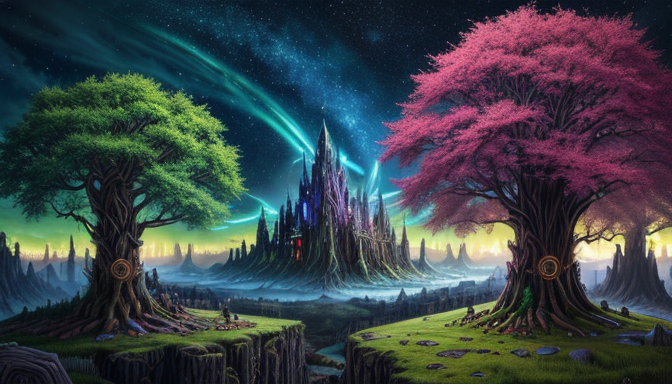Fantasy worlds have a magical way of capturing our imaginations, transporting us to realms where anything is possible. From the **ancient myths** that first sparked our curiosity to the **immersive experiences** we enjoy today, the evolution of these worlds is nothing short of fascinating. Take, for instance, iconic universes like Dungeons & Dragons, Forgotten Realms, and Warhammer. These settings have rich lore and intricate world mechanics that not only entertain but also inspire countless storytellers and players alike.
In the early days, fantasy was rooted deeply in **mythology and folklore**. Legends of gods, monsters, and epic quests laid the groundwork for modern storytelling. Think of how **Homer’s Odyssey** introduced us to mythical creatures and heroic journeys, setting a precedent for the vast landscapes we explore today. Fast forward to the present, and we see how these foundational stories have blossomed into complex universes filled with unique characters and histories.
Today, technology plays a pivotal role in shaping our fantasy experiences. With the rise of video games and virtual reality, players can now step into these worlds like never before. Imagine wandering through the **enchanted forests of the Forgotten Realms** or strategizing your next move in a **Warhammer battle**. The blend of **visual storytelling** and interactive gameplay creates a **dynamic experience** that keeps evolving, enticing both new and seasoned fans. The question remains: where will the next chapter in fantasy worlds take us?
The Origins of Fantasy Worlds
When we think about the origins of fantasy worlds, our minds often drift back to the enchanting tales spun by ancient civilizations. These early stories, rich with mythology and folklore, laid the groundwork for what would eventually blossom into the vibrant realms we know today. Iconic universes like Dungeons & Dragons and Forgotten Realms draw heavily from these roots, weaving intricate lore and mechanics that captivate players and readers alike.
Take a moment to consider the mythical creatures and heroes that populate these stories. From the wise wizards of Arthurian legends to the fearsome dragons of Norse mythology, these characters have transcended time, inspiring modern fantasy creators. The Warhammer universe, for instance, is steeped in a rich tapestry of lore that combines elements from various mythologies, creating a unique world that feels both familiar and alien.
Moreover, the mechanics of these fantasy worlds are just as fascinating. In Dungeons & Dragons, players are not merely spectators; they are active participants in a living narrative. The rules and systems in place allow for a dynamic storytelling experience, reminiscent of the oral traditions where stories were told and retold, evolving with each telling. This interactive aspect is a modern twist on ancient storytelling, making the fantasy genre more immersive than ever.
In essence, the origins of fantasy worlds are a beautiful blend of history, myth, and innovation. As we delve deeper into these realms, we uncover not just the stories themselves, but the cultural influences that shaped them. It’s a journey that connects us to our past while igniting our imagination for the future.

Modern Interpretations and Trends
In the vibrant landscape of modern fantasy, we find ourselves immersed in iconic universes that have captivated the imagination of millions. Take Dungeons & Dragons, for instance. This legendary tabletop role-playing game has not only transformed the way we view storytelling but has also created a community where players can craft their own narratives within a framework of intricate rules and rich lore. The allure of Forgotten Realms—a campaign setting brimming with diverse cultures, epic quests, and memorable characters—invites players to explore a world where magic and adventure intertwine seamlessly.
But let’s not forget the Warhammer universe, which brings a darker, more gothic twist to fantasy. With its grimdark setting, where every choice could lead to peril, Warhammer has developed a dedicated following that appreciates the depth of its lore and the complexity of its world mechanics. These universes are not just about battles and quests; they represent a tapestry of stories woven through time, showcasing how fantasy can reflect our own world’s trials and triumphs.
As technology advances, the realms of fantasy have expanded beyond traditional media. Video games, movies, and even virtual reality experiences allow fans to step directly into these imaginative worlds. The incorporation of augmented reality and immersive storytelling techniques has made it possible for enthusiasts to not just observe but participate in the unfolding narratives. This evolution invites us to ask: how will the next generation of fantasy worlds shape our understanding of storytelling?
In conclusion, modern interpretations of fantasy are a testament to the genre’s adaptability and enduring appeal. As we continue to explore these realms, we find that they serve as mirrors reflecting our hopes, fears, and dreams, making the journey through time all the more thrilling.
Frequently Asked Questions
- What are fantasy worlds?
Fantasy worlds are imaginative realms created in literature, films, and games that often include magical elements, mythical creatures, and unique landscapes. They transport us to places where the impossible becomes possible!
- How did fantasy worlds originate?
The roots of fantasy worlds can be traced back to ancient myths and folklore. These stories laid the groundwork for modern storytelling, allowing us to explore the depths of imagination and creativity.
- What influences modern fantasy worlds?
Today’s fantasy worlds are shaped by various cultural influences, technological advancements, and popular media trends. From video games to blockbuster films, the fusion of different elements creates diverse and captivating realms.
- How have fantasy worlds evolved over time?
Fantasy worlds have transformed significantly, adapting to societal changes and technological innovations. As we move forward, these realms continue to expand, offering new experiences and narratives that resonate with audiences.
- Why are fantasy worlds so popular?
People love fantasy worlds because they provide an escape from reality. They allow us to dream, explore, and experience adventures beyond the limits of our everyday lives. Who wouldn’t want to wield magic or embark on epic quests?

Recent Comments